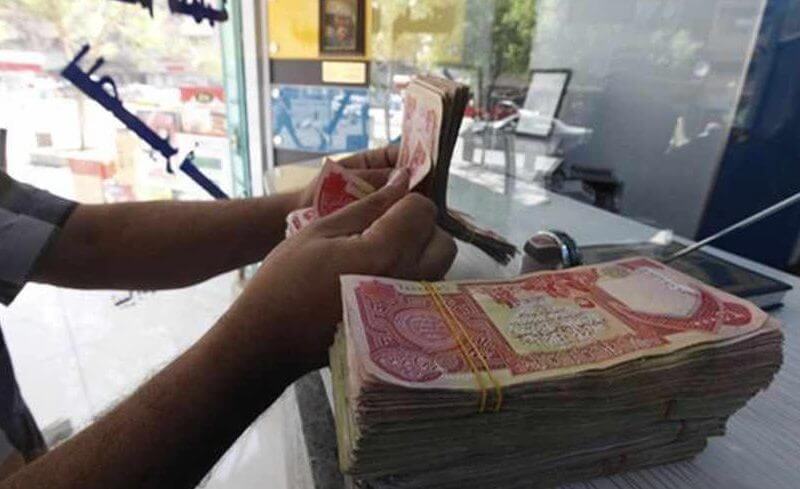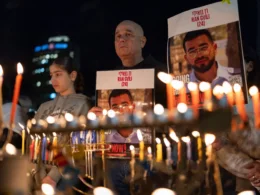In Baghdad, following the pressures imposed by the United States Federal Reserve on the Central Bank of Iraq to limit corruption and illegal outflow of dollars paralyzing Iraq's economy, new reports reveal that many Iraqi officials and bankers have resorted to cross-border smuggling.
According to a eport by Middle East Eye, the restrictions placed by the U.S. Federal Reserve restrict Iraq's dollar auction, which the Iraqi government uses to convert American dollars received for oil sales. Since 2003, Iraq has faced one of the biggest financial crises, according to the Federal Reserve.
With the inability to convert petrodollars into dinars, the Iraqi government is currently struggling to pay obligations, including the salaries of millions of government employees, pensions, and social support.
This week, Mustafa Ghaleb, Iraq's governor of the Central Bank, resigned from the position "because of his inability to face the crisis," according to an advisor to Iraqi Prime Minister Mohammed Shia al-Sudani to Middle East Eye.
In the past, the Iraqi government has tried to confront the crisis, opening up more official currency exchange offices, launching a scheme to encourage small-scale traders and investors to use the dollar auctions, suspending taxes on commodities, and introducing subsidies. Despite all these actions, the dollar auction's sales are still below average.
According to reports, foreign currency auction data showed that sales for January of this year did not exceed $131 million per day on average, compared to $227 million in October of last year, resulting in increasing dollar exchange rates on the black market.
Last week, the dollar exchange rate on the Baghdad black market reached 1,740 dinars per dollar, compared to 1,480 in October of last year. As a result, this has led to knock-on effects at wholesale markets, reflected in consumer goods, sugar, and cooking oil.
The U.S. government's new auditing measures have placed stricter scrutiny on the source of foreign money being used to buy dollars at the dollar auction and imposed in November 2022.
According to reports, Iraqi government officials, bankers, and owners of exchange and financial brokerage companies said that the measures have led to merchants and capital owners hesitating to participate in the auction to avoid revealing their identities, the reason for money transfers, the identity of the beneficiary and other sensitive information.
Many of these officials have turned to the black market and other illegal routes to obtain dollars, sparking a significant rise in dollar smuggling out of Baghdad by land.
"The major customers do not want to reveal any information related to the sources of their money or their identities for security or financial reasons, and some do not want to waste time in routine paper procedures," said a member of the Iraqi Private Banks League to Middle East Eye.
"This mechanism is no longer available now, and so there is much reliance on the black market to secure dollars and transfer them through unofficial outlets," the official added.
Officials have also said that dollar-smuggling operations have been growing by land through the Kurdistan region in northern Iraq and from there to Turkey and Dubai.
Responding to these actions, the Iraqi government has enacted new checkpoints with sonar devices along the road from Iraq's capital to Kurdistan. Iraqi security forces have also launched a campaign to track down the currency exchanges and brokers who have bought and sold dollars on the black market. According to security officials, many of these smugglers have faced arrest in the past few days.
On social media, group chats that used to request dollars and private bankers and brokers were deleted out of fear of being hacked or taken over. Despite these initiatives, around $70 million were smuggled daily from Iraq through Kurdistan.
Since 2004, the Iraqi economy has relied heavily on oil sales deposited with the U.S. Federal Reserve. In the past decade, the Central Bank of Iraq requested dollars from the Federal Reserve to extract its funds and turn them into dinars, selling them to private banks and currency exchanges through the dollar auction.
Over the years, the U.S. has grown tired of the dollar auction being used to wash money and flow dollars to anti-American regimes in the Middle East, like Syria and the Islamic Republic of Iran, which are currently under U.S. sanctions.
In November 2022, a scandal occurred when $2.5 billion was illegally extracted from an Iraqi government bank account and washed through private banks, prompting the Federal Reserve to bring new checks on money transfers used in the auction. In the following months of the scandal, the cost of transferring money abroad increased by one-and-a-half times, making it expensive for owners of exchange and financial brokerage companies, according to Middle East Eye.
Following the numerous parliamentary elections in Iraq, the country has faced corruption and criminal activities such as oil, drug, and weapon smuggling, leaving cash to flow throughout the Iraqi economy. With the country being a hotbed for Sunni and Shiite terrorist groups, annual reports from Iraq's Central Banks Money Laundering and Terrorist Financing Office for 2019, 2020, and 2021 revealed that international and domestic monetary transfers were the tools most commonly used for money laundering.
Related Story: 5 Reasons to Pay Attention to Iraq Right Now









